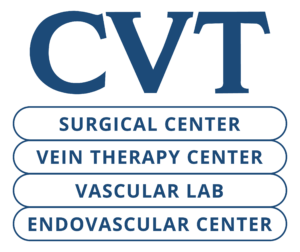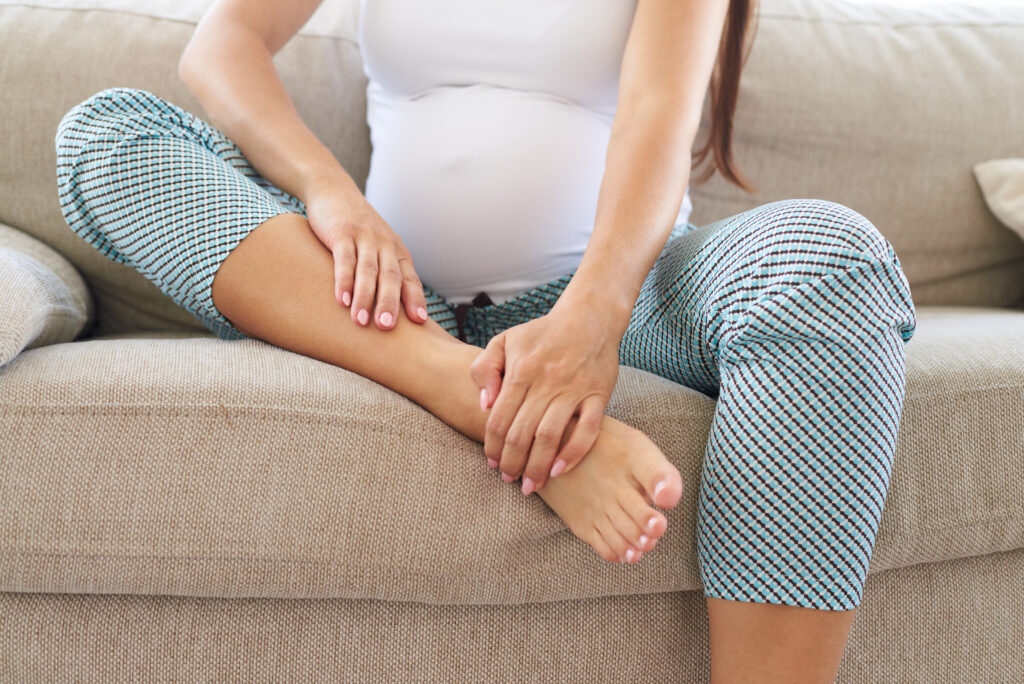Varicose veins are a prevalent medical condition characterized by enlarged, twisted veins that are often blue or purple. Typically, these veins manifest in the legs due to the higher pressure exerted on the lower body by standing and walking. The underlying cause of varicose veins is the malfunctioning of valves within the veins. These valves are meant to facilitate unidirectional blood flow back to the heart. When the valves become weak or damaged, they fail to close properly, causing blood to flow backward and accumulate in the veins. This pooling of blood increases venous pressure, leading to vein enlargement, visible bulging, and the distinctive coloration associated with varicose veins.
Why are Varicose Veins More Visible During Pregnancy?
During pregnancy, increased blood volume and hormonal changes affect your veins’ elasticity, causing them to be more visible and prominent, leading to more noticeable varicose veins. As pregnancy progresses, the growing uterus puts pressure on the veins in the pelvic area and the inferior vena cava, which is the large vein on the right side of the body that receives blood from the lower limbs. This pressure can hinder the blood flow and cause it to pool in the leg veins, leading to the development of varicose veins.
Hormonal changes during pregnancy can also contribute to the development of varicose veins. The hormone progesterone, which helps relax the muscles in the uterus to accommodate the growing baby, can also relax the walls of the veins, making them more prone to enlargement and further increasing the likelihood of valve dysfunction and blood pooling.
How Can Varicose Veins Impact My Pregnancy?
Pregnant women who develop varicose veins may experience a range of uncomfortable and painful symptoms. The primary manifestations include discomfort, pain, and aching in the legs, which can be exacerbated by prolonged standing or sitting. Many pregnant women with varicose veins also experience swelling or edema in the legs, ankles, and feet, often more noticeable at the end of the day or after periods of inactivity. A sensation of heaviness or fullness in the legs is also common, making daily activities more challenging. Additionally, cramping, particularly at night, can disrupt sleep and contribute to overall fatigue.
“Varicose veins often have a hereditary component. If your mom or grandmother had them during pregnancy, you may be more likely to develop them. They are generally considered harmless. I usually suggest that my patients keep an eye on them and, if they begin to cause a lot of discomfort during the pregnancy, that they be evaluated by a vein specialist.”
– Dr. Sarah Davis, Louisiana Women’s Healthcare
In rare cases, varicose veins during pregnancy can lead to more serious complications, such as the formation of blood clots within the superficial veins, a condition known as superficial thrombophlebitis. While these clots are usually not life-threatening, they can cause significant pain and inflammation in the affected area. A more serious concern is the potential development of deep vein thrombosis (DVT), a condition where blood clots form in the deeper veins of the legs. DVT is a medical emergency because if a clot dislodges, it can travel to the lungs, causing a pulmonary embolism, which can be life-threatening. Symptoms of DVT include severe pain, swelling, redness, and warmth in the affected leg. Pregnant women should be particularly vigilant about these symptoms and seek immediate medical attention if they occur.
Managing Varicose Veins During Pregnancy
While varicose veins during pregnancy may not be entirely preventable, some measures can help reduce the risk and alleviate symptoms.
- Engage in regular exercise to improve circulation and strengthen the leg muscles.*
- Elevate the legs whenever possible to reduce swelling and alleviate discomfort.
- Wear compression stockings or maternity support hose to provide gentle pressure and support to the veins.*
- Avoid prolonged periods of sitting or standing, and take breaks to move around and stretch the legs.
- Maintain a healthy weight to minimize the pressure on the veins.
- Avoid tight clothing or shoes that restrict circulation.
*It is important to consult with a healthcare provider before starting any exercise program or using compression stockings during pregnancy to ensure they are safe and suitable for individual needs.
Each pregnancy is unique, and the severity of varicose veins can vary from one pregnant woman to another. If you develop varicose veins during pregnancy that are particularly bothersome or symptoms worsen as your pregnancy progresses, you may want to consult with a healthcare provider for further evaluation and treatment options. The expert physicians and staff at CVT are committed to providing exceptional care for all of your vascular needs both during your pregnancy and after. Contact us for an appointment today.

